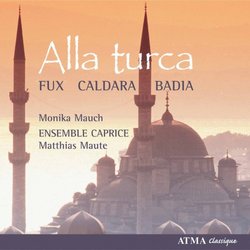Imperial Vienna
R. C. BOSCH | Spain | 12/02/2007
(4 out of 5 stars)
"This is an excellent review of Church music in the Imperial Vienna of Charles VI, mainly from Fux. In many aspects, this compilation is preferable to that from Lorenz Duftschmid on cpo (lux aeterna)
The Badia selection is also excellent."
Fox on Fux
Giordano Bruno | Wherever I am, I am. | 02/14/2009
(5 out of 5 stars)
"No, that's not the title of a new Dr. Seuss Book! The Fux in question is Johann Joseph (1660-1741), the imperial composer for three Hapsburg emperor's and the pride of Austrain Baroque music. His works are represented by five incidental sacred concertos for voice, by three sonatas, and by the partita "Turcaria" which supposedly depicts the retreat of the Turks from the Siege of Vienna in 1683. Battle pieces were a popular staple of Baroque music, and Fux's is a typical showpiece for instruments and drums, though it sounds hardly more authentically Turkish than Turkey in the Straw. It was only after the Ottoman Empire began its long decline that Turkish 'flavors' became fashionable in European music and philosophy.
The Fox in question is the vocally gorgeous Monika Mauch, whose foxy wiles with Baroque ornamentation and rapid passages bring Fux out of his historic den, and whose voice is as silky suave as a fox's tail. I'm not alone in my appreciation of Mauch; she seems to appear on every CD I hear these days.
Ensemble Caprice is co-directed by two brilliant recorder players - Matthias Maute and Sophie Larivière - and the recorder is the most prominent treble instrument on all their recordings. For this performance, they are joined by two violins, cello, theorbo, harpsichord/organ, and Ziya Tabassian on percussion. The Turcaria is the only track involved percussion or Turkish exotica, however; the rest of the music is mainline Austro-Italian. Caprice is one of the few ensembles capable of making the recorder flutes, both the alto and the tenor, as satisfying and expressive as strings or cornetti.
In addition to the Fux compositions, the Cd includes a substantial and charming pastoral oratorio for soprano, recorders and violins, by Carlo Badia, another Italian who worked at the Hapsburg court. This may be the world premiere recording of anything written by Signore Badia, but it's artful enough to justify hoping for more. The text concerns the mythical Phoenix, who morphs into a bit of imagistic flattery of the Emperor Leopold.
The other large composition on the disk is the Fux Sonata en ré mineur, which is all fire and and velvet for the recorders, especially the phenomenal final "rigaudons" movement. Maute does with his recorder what that wooden whistle was made for: he plays more notes per measure gracefully than most of us can count."

